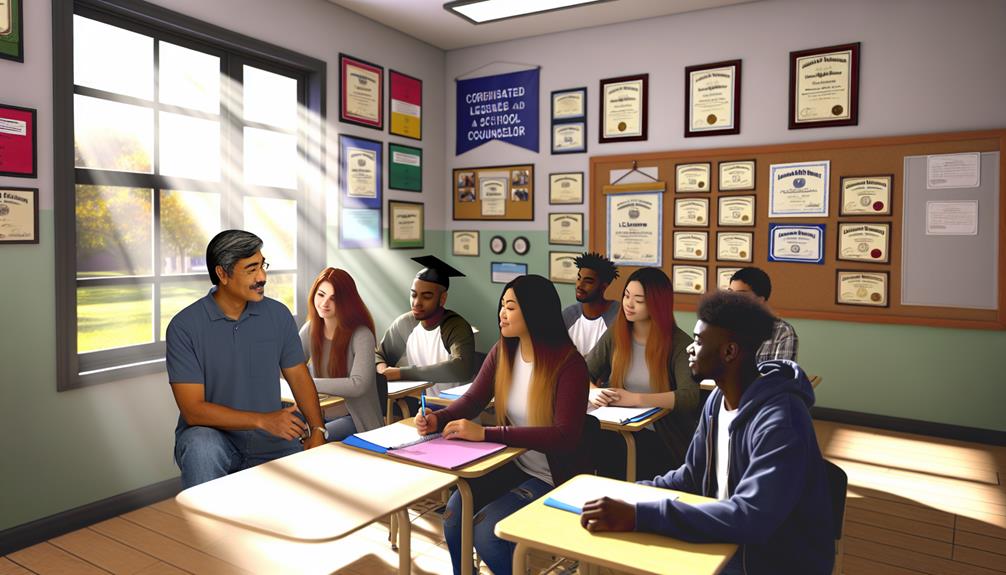To become a school counselor in the USA, you'll need a master's degree in school counseling or a related field from an accredited program. This includes completing a 100-hour practicum and a 600-hour supervised internship in a K-12 setting. After that, you'll pass your state-specific licensure exam, like Praxis II. Most states also require background checks to guarantee student safety. Strong communication, empathy, and organizational skills are essential for success in this role. The demand for school counselors is growing, making it a rewarding career choice. There's more to explore about the journey ahead!
Key Takeaways
- Obtain a master's degree in school counseling or a related field from an accredited program, including coursework and supervised field experience.
- Complete a 100-hour practicum and a 600-hour supervised internship in a K-12 setting to gain practical experience.
- Pass a state-specific licensure examination, such as Praxis II, to qualify for certification in your state.
- Undergo background checks to ensure compliance with ethical standards for working with students, as required by state regulations.
- Pursue ongoing continuing education to maintain licensure and stay updated on counseling practices and regulations.
Overview of School Counseling
School counseling plays an essential role in fostering students' overall development. As a professional school counselor, you'll support students in their academic, emotional, and social growth. Typically, you'll need a master's degree in school counseling or a related field, which emphasizes practical experience through internship opportunities. This hands-on training is imperative, allowing you to apply theoretical knowledge in real-world settings.
Certification requirements vary by state, often necessitating passing specific examinations and completing continuing education for renewal. With a growing demand for school counselors projected at 5% from 2022 to 2032, your role in providing mental health support and academic guidance is increasingly significant. Schools recognize the importance of addressing students' emotional development, which contributes to a positive learning environment.
In terms of compensation, the average annual salary for school counselors in the U.S. is around $61,710, with variations based on your location, experience, and the educational level at which you work. This profession not only offers a rewarding career but also the opportunity to make a substantial impact on students' lives.
Educational Pathway
Becoming a school counselor requires dedication and a clear educational pathway. To start, you'll typically need a master's degree in school counseling or a related field, as most states mandate this level of education for certification. Look for accredited programs that cover essential topics like counseling theories, ethics, and techniques.
Your journey should also include supervised field experience, which often involves a 100-hour practicum and a 600-hour internship. Many universities, like NYU Steinhardt, offer flexible online options for obtaining your degree, allowing you to complete it in about 18 months.
Once you've earned your master's degree, you'll need to meet state requirements, including passing state-specific examinations like the Praxis II test. This step is vital for fulfilling licensure requirements for school counseling in your area.
Moreover, remember that continuing education and professional development are often mandated to maintain your certification. Staying updated on best practices and legislative changes in the field will not only enhance your skills but also guarantee you provide the best support to students in your care.
Licensure and Certification

After completing your educational pathway, the next step involves obtaining the necessary licensure and certification to practice as a school counselor. Most states require you to have a master's degree in school counseling or a related field from an accredited institution. This educational requirement is foundational for your licensure.
In addition to your degree, you'll need to complete a supervised internship, usually comprising 600 hours in a K-12 setting. This hands-on experience is essential for your development as a counselor. After your internship, you must pass a state-specific examination, like the Praxis II for school counseling, which has varying minimum score requirements depending on your state.
Licensure and certification durations can range from 2 to 10 years, and many states also mandate ongoing continuing education to keep your credentials active. If you plan to move, check for reciprocity agreements, as some states allow certified counselors from one state to obtain licensure in another with fewer requirements. Always stay updated on your state requirements to guarantee you meet all necessary criteria for licensure and certification.
Essential Skills
To thrive as a school counselor, you need a diverse set of essential skills that foster effective interactions with students, parents, and teachers. These skills are crucial for addressing the emotional and academic needs of students while creating a supportive environment.
Here are some key skills you should develop:
- Effective communication skills: Engage clearly and empathetically with students, parents, and teachers.
- Organizational skills: Manage multiple student cases and counseling sessions efficiently.
- Empathy: Build trust and rapport with students, helping them feel understood and supported.
- Conflict resolution and crisis management: Address student needs and navigate challenging situations effectively.
Additionally, having a solid foundation in developmental psychology will help you understand the diverse emotional and academic needs of students across different age groups. By honing these skills, you'll be better equipped to guide students through their challenges, ensuring they receive the support they need to thrive in their educational journey. Embrace these essential skills, and you'll create a positive impact on the lives of the students you serve.
Experience Requirements

Gaining practical experience is an essential step in your journey to becoming a school counselor. Most states require you to complete supervised field experience, which typically includes a 100-hour practicum and a 600-hour internship in K-12 educational settings. This hands-on experience is fundamental for your certification.
Here's a quick overview of experience requirements:
| State | Practicum Hours | Internship Hours |
|---|---|---|
| Pennsylvania | 100 | 300 |
| Tennessee | 100 | 600 (both levels) |
| Puerto Rico | 100 | Substitute 1 year of counseling experience |
Requirements vary by state, so it's important to check your specific state's guidelines. For instance, while Tennessee mandates thorough exposure across both elementary and secondary school settings, Texas has simplified the pathway by no longer requiring two years of classroom teaching experience.
Your education program should prepare you for these real-world experiences, ensuring you gain the necessary skills and insights. Embrace this opportunity to build your experience in schools, as it's significant in shaping you into an effective school counselor.
Examination Process
Steering through the examination process is an important step in your journey to becoming a school counselor. Most states require you to pass state-specific examinations to obtain certification or licensure. One of the most recognized tests is the Praxis II, particularly the School Guidance and Counseling exam, which often has a minimum score requirement.
Before you take the plunge, you'll want to familiarize yourself with:
- State-specific exams: Each state has its own requirements.
- Minimum score requirements: For example, Tennessee requires a score of 580.
- Certification processes: States like Pennsylvania mandate the Praxis for certification.
- Licensure specifics: In Rhode Island, you need to pass the Praxis II Professional School Counselor test (5422).
It's vital to check your individual state requirements, as they can vary greatly. States like Texas require a minimum score of 240 on the TExES #152 exam, while South Dakota has its own designated test. Understanding these nuances will help you prepare effectively and guarantee you meet the necessary benchmarks to advance your career in counseling.
Background Checks

Background checks are an important part of the journey to becoming a school counselor, guaranteeing that you meet the ethical standards necessary to work with students. Most states have specific requirements for background checks, focusing on the safety and well-being of students. For instance, Ohio mandates both Bureau of Criminal Investigation (BCI) and FBI background checks for initial and renewal licenses. This requirement helps confirm that you align with the ethical standards expected in the profession.
In Oregon, fingerprint processing is a key step in the certification process for school counselors. Every aspiring counselor must undergo this procedure to verify they have no disqualifying criminal history. The Northern Mariana Islands also require fingerprint processing for all first-time applicants and returning applicants after two years.
It's important to note that background check requirements can vary considerably by state. Some states may conduct checks more rigorously than others, leading to differences in how often you may need to renew or update your background check. Staying informed about your state's specific requirements is essential as you progress in your career as a school counselor.
Career Opportunities
School counseling offers a range of exciting career opportunities that cater to various interests and skills. As a school counselor, you can work in diverse educational settings, including elementary, middle, and high schools, as well as colleges and universities. With the current shortage of counselors, you'll find a steady demand for your expertise, especially since approximately 11 million high school students lack sufficient counseling support.
Here are a few potential career paths in school counseling:
- Elementary School Counselor: Focus on early childhood development and support.
- High School Counselor: Assist students in steering through academic and career options.
- College Counselor: Help students shift to higher education or vocational training.
- School Counseling Coordinator: Oversee counseling programs and staff, often requiring an advanced degree.
With a projected 5% employment growth for school counselors from 2022 to 2032, pursuing certification through accredited school counseling programs can enhance your job prospects. Depending on your role and setting, the median annual salary varies, but many professionals enjoy competitive compensation, especially in top employers, such as elementary schools.
Salary and Job Outlook

As you consider a career in school counseling, it's important to understand the salary expectations and job outlook for this vital profession. According to the Bureau of Labor Statistics, the median annual salary for school counselors in the United States was approximately $61,710 as of May 2023. With a projected employment growth of 5% from 2022 to 2032, the demand for counseling services in educational settings is set to increase.
California stands out with the highest employment level for school counselors, offering a mean salary of around $81,100. Counselors working in elementary schools tend to earn a median salary of $71,700, which is higher than the average for all counseling positions.
Many job openings for school counselors will arise from retirements and occupational transfers, highlighting the ongoing need for professionals in this field.
| State | Median Salary | Employment Growth |
|---|---|---|
| USA | $61,710 | 5% |
| California | $81,100 | 5% |
| Elementary | $71,700 | 5% |
| All Levels | $61,710 | 5% |
| Job Openings | Varies | Increasing |
This data emphasizes the stability and potential of a career in school counseling.
Frequently Asked Questions
How Do I Become a School Counsellor in Usa?
To become a school counselor, you'll need to earn a master's degree in school counseling or a related field, which usually takes 2-3 years. You'll also complete specific internships, including a practicum and a 600-hour internship in a K-12 environment. After that, you must pass a state-specific certification exam and complete a background check. Don't forget to keep up with continuing education to maintain your licensure!
What Degree Do Most School Counselors Have?
Most school counselors hold a master's degree in school counseling or a related field. This degree typically includes coursework in counseling theories and ethics, along with practical field experiences. Some states require a bachelor's degree before pursuing your master's, while others have specific educational mandates for certification. If you're aiming to work in a diverse environment, consider programs that emphasize social justice and offer bilingual counseling options.
What Qualifications Do You Need to Be a Counsellor in Usa?
To be a counselor in the USA, you'll typically need at least a master's degree in counseling or a related field. You'll also have to complete a supervised internship, which often includes a practicum and extensive hands-on experience. Certification or licensure is necessary in your state, requiring you to pass specific exams. Additionally, you'll need to stay updated with continuing education to maintain your credentials and meet any state-specific requirements.
How Do I Get a Counselling License in Usa?
To get a counseling license in the USA, you'll need to start by earning a master's degree in counseling or a related field from an accredited institution. After that, you'll complete a supervised internship and log a specific number of supervised hours, typically between 300 to 600. Next, pass an extensive exam, submit your application, and undergo a background check. Don't forget to stay current with continuing education requirements to maintain your license!
